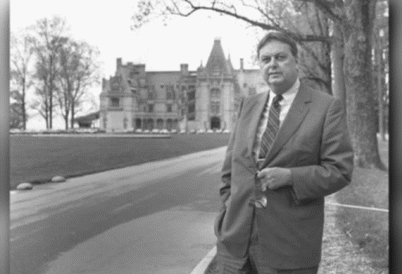
The Great Smoky Mountain Journal
Staff, Wire Reports
Posted: Sunday, January 21, 2018 07:20 PM
Owner Of Biltmore Estates Dies At Age 89
William Amherst Vanderbilt Cecil, owner
of the Biltmore Estate and a champion of its preservation and success,
died at his Asheville home TuesdayCecil also was the grandson of the
estate's famous builder, George Washington Vanderbilt III. Cecil was 89.
“My father’s legacy is immeasurable for our family,” Bill Cecil Jr.,
William Cecil’s son and president & CEO of the Biltmore Company, which
owns and operates Biltmore Estate, said in a press release. “He will
always be remembered for his leadership, vision and dedication to
Biltmore. He had the foresight to do what everyone thought was
impossible."
Cecil said his father devoted himself to the estate's preservation, and
he was determined to make the estate self-supporting. The 8,000-acre
estate, French-style chateau and on-site attractions such as the Antler
Hill Village retail area and a winery now host more than 1.4 million
tourists annually, but during the mid-20th century the estate struggled
financially.
Born Aug. 17, 1928, at his family home in Asheville, William A.V. Cecil
was the youngest son of Cornelia Vanderbilt Cecil and John Francis
Amherst Cecil. He was educated in England and Switzerland, then served
in the British Navy near the end of World War II.
After graduating from Harvard University in 1952, Cecil worked in
finance at Chase Manhattan Bank in Washington, D.C., and with Chase’s
international department in New York.
In 1957, Cecil married Mary “Mimi” Ryan, a lawyer with a Wall Street
firm. Three years later they moved from New York to Asheville,
determined to preserve Biltmore by boosting tourism, not only to the
estate but also to the Asheville region.
George Vanderbilt completed the estate in 1895, but he died in 1914 in
Washington, D.C. from complications after an appendectomy.
While William A.V. Cecil's parents had opened the Biltmore house to the
public in 1930, it was not a money-maker. A 2016 Citizen-Times story
noted the estate turned its first profit in 1969, a decade after Mimi
and William Cecil returned to Asheville.
It was not quite $17.
"My dad was very proud of that," Bill Cecil said with a smile at the
time.
In its press release, the Biltmore Co. said Cecil's leadership
"propelled restorations to Biltmore House, renovations across the
estate, and unparalleled growth for the Biltmore Company based on his
unique business philosophy of a profitable private enterprise supporting
preservation."
He would do anything for the company, including taking pictures and
writing marketing copy.
His devotion to the estate was unquestioned, and it was never about
bringing in huge profits. In its press release, the Biltmore Co. cited
an oft-repeated quote of the elder Cecil: “We don’t preserve Biltmore to
make a profit. We make a profit to preserve Biltmore."
Steve Miller, 62, worked for the Biltmore Company for 38 years, starting
in college when he would literally muck out livestock stalls. He
considers Cecil one of the "great men" of Asheville, a true gentleman
and visionary who did not seek out the spotlight but was quietly
instrumental in the progress of the estate, and the region.
While the estate is flooded with tourists almost year-round now, it's
easy to forget that in the middle of the last century the estate was
losing $250,000 a year, Miller said. The famous Biltmore Dairy was
self-sufficient, but overall, taxes and operating costs siphoned off
more money than the estate could generate.
Despite industry experts who told him he could never turn a profit on a
historic property, Cecil persevered, determined not only to succeed but
also to keep the estate privately owned. It is the largest privately
owned home in America.
"He recognized the potential for Biltmore — and Asheville — to become
really significant national tourism destinations," said Miller, who now
owns a consulting business and teaches business at UNC Chapel Hill. "Had
it not been for his foresight and his determination, Biltmore would not
be what it is today, and I don’t think Asheville would be what it is its
today."

